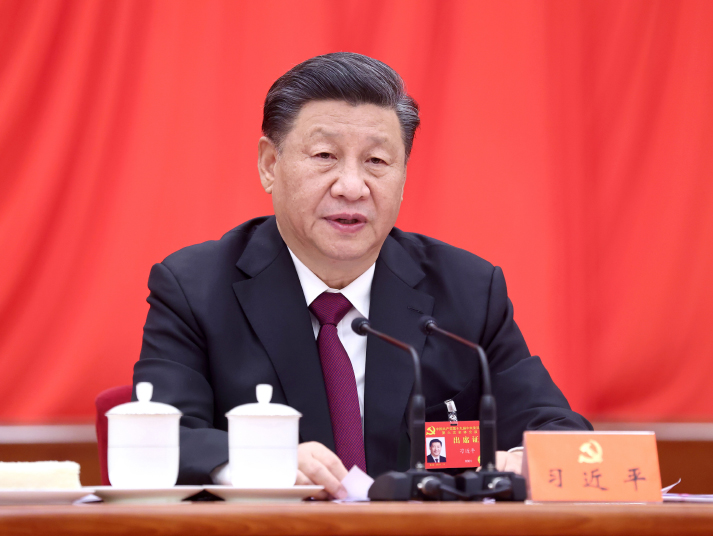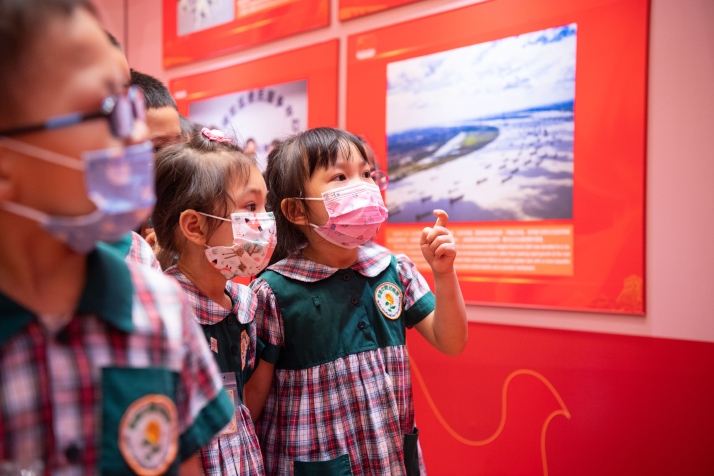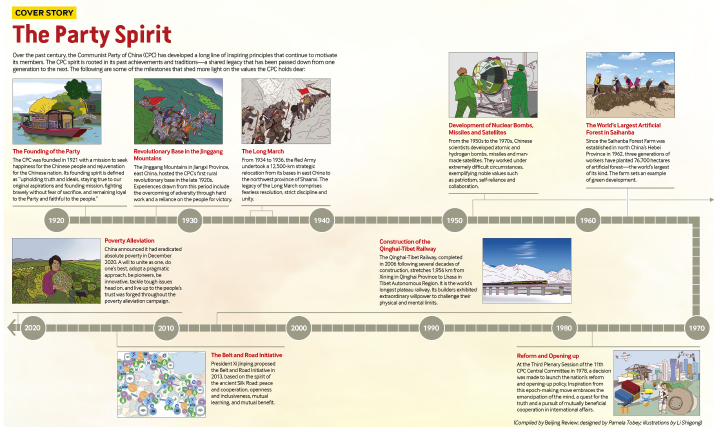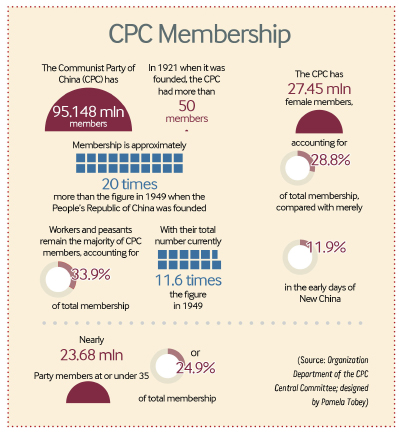| Top 10 Nation News Stories |
| New Blueprint | |
| According to a document titled The CPC: Its Mission and Contributions, released in August, more than 36,000 people from these parties were involved in this work | |
|
|
 Xi Jinping, General Secretary of the Communist Party of China (CPC) Central Committee, at the Sixth Plenary Session of the 19th CPC Central Committee in November in Beijing (XINHUA)
In 1969, by the time he turned 16, Xi Jinping arrived in a small village in Shaanxi Province as a zhiqing, or "educated youth." Educated youth were young urban people who either volunteered or were sent to work in rural areas as part of a campaign launched by Chairman Mao Zedong that called on urban youth to work in rural areas during the period from the 1950s to the end of the "cultural revolution" (1966-76). Life there was tough for the young Xi. In the beginning, fleas troubled him so badly that he was unable to fall asleep. Every day he undertook all kinds of labor of the countryside, such as reclaiming wasteland, hoeing, herding, hauling coal, and carrying manure. As time passed, tough work became easy. Xi became a hardworking capable young man in the villagers' eyes. Gaining their trust, he was elected village Party chief. He was once awarded a motorized tricycle after being named a "model educated youth." However, he exchanged the tricycle for a walking tractor, a flour milling machine and farm tools to benefit the villagers. Life in Shaanxi cultivated his firm faith, which is, as a public servant, one should do more real work for the people, Xi once said. In 1975, Xi left the village, pursued further education and embarked on decades of new journeys in politics. He rose from a grassroots Party chief to the leader of the Communist Party of China (CPC), and from an ordinary citizen to the country's president. A landmark resolution of the CPC, released on November 16, highlighted the Party's major achievements and historical experience. It also underlined the importance of upholding Xi's core position on the CPC Central Committee and in the Party as a whole. The resolution was adopted at the Sixth Plenary Session of the 19th CPC Central Committee held from November 8 to 11. "This is the call of the times, the choice of history, and the common will of the people," said Jiang Jinquan, head of the Policy Research Office of the CPC Central Committee, at a CPC Central Committee press conference on the Sixth Plenary Session of the 19th CPC Central Committee.  Students visit a photo exhibition on Party history in Macao Special Administrative Region on July 12 (XINHUA)
Leadership core "A collective leadership must have a core. Without a core, no leadership can be strong enough," late Chinese leader Deng Xiaoping once said. In a speech in 1989, Deng explained that the core of the first generation of collective leadership was Chairman Mao. Because of that core, the "cultural revolution" did not bring down the Party. The Party's exercise of leadership remained stable during its second generation, with Deng at its core. In January 1935 during the arduous Long March, the Political Bureau of the Central Committee convened a conference in Zunyi, Guizhou Province, where Mao was confirmed as the de facto leader of the Central Committee and the Red Army. The meeting laid the groundwork for the formation of the first generation of the central collective leadership with Mao at its core. On October 1, 1949, the founding of the People's Republic of China was proclaimed after years of struggle, carried out by the people under the leadership of the Party and with the active support of other political parties and people without party affiliation. Regrettably, the correct line adopted at the Party's Eighth National Congress in 1956 was not fully upheld in the years that followed. Mistakes were made, and the Central Committee failed to rectify these mistakes—including the "cultural revolution" launched by Mao—in good time. Counter-revolutionary cliques took advantage of these mistakes, and committed many crimes that brought disaster to the country and its people, resulting in 10 years of domestic turmoil which caused the Party, the country, and the people to suffer serious losses and setbacks. "This was an extremely bitter lesson," the resolution said. Acting on the will of the Party and the people, the Political Bureau of the Central Committee took swift action to bring the Gang of Four, one of the main counter-revolutionary forces, to justice in October 1976, putting an end to the catastrophic "cultural revolution." According to the resolution, despite the serious setbacks it encountered in the process of exploration, the Party made creative theoretical achievements and great progress in socialist revolution and construction, which provided valuable experience, theoretical preparation, and material foundations for launching socialism with Chinese characteristics into a new historical period. In December 1978, due in large part to Deng's leadership, the Third Plenary Session of the 11th CPC Central Committee made the historic decision to shift the focus of the Party and the state to economic development and initiated a policy of reform and opening up. "In a big country like ours with more than 95 million Party members, 56 ethnic groups and 1.4 billion people, it is unthinkable for the Party's Central Committee and the Party as a whole not to have a core. Nothing could be achieved if that were the case. Only when there is a core, can the Party have strength," Jiang elaborated. Building on the achievements of previous central collective leaderships, Xi has been continuing to carry out reforms to lead the country and the people for the better in an increasingly complex world. In November 2012, at the age of 59, Xi was elevated to the Party's most senior post, when China's strength had significantly risen after more than three decades of reform and opening up proposed by Deng. Two weeks after Xi's election as General Secretary of the CPC Central Committee, he put forward the Chinese dream of national rejuvenation. Xi's status as the core of the CPC Central Committee and the whole Party was endorsed at the Sixth Plenary Session of the 18th CPC Central Committee in 2016. Under his leadership, progress has been made in various fields. As part of its self-reform efforts to better serve the people, the CPC has been unswerving in its fight against corruption. For instance, in the first 11 months of 2020 alone, over 1,200 fugitives were brought back from overseas and 2.45 billion yuan ($384 million) of misappropriated money was retrieved, according to statistics from the Central Commission for Discipline Inspection (CCDI) of the CPC, the top disciplinary body. In addition, 18 central government officials were investigated. "Corruption and misconduct that occur on people's doorsteps must be addressed in order to promote social fairness and justice as well as safeguard their legitimate rights and interests," a CCDI communiqué adopted in January reads. Poverty alleviation is another example. The CPC set the goals that by 2020 it would help lift the nation's entire rural population out of poverty as defined by the existing standard, and raise all impoverished counties out of poverty. "No single poor area or single poor person should be left behind in achieving this goal," Xi emphasized. Through the cooperation and active support of the whole Party and all sectors of society across the country, this goal was successfully achieved. In 2020, faced with the sudden onset of COVID-19, Xi mapped out new plans for mobilization on poverty alleviation, emphasizing that lifting poor people in the rural areas out of poverty must be achieved as scheduled. "It is non-negotiable. This is a tough battle with no route of retreat. We must double our efforts. We must not pause, slacken off or be negligent," Xi said, asking the whole Party to perform well in this difficult test, to apply more determination and more vigor, and to be confident in bringing the battle to a successful end. Now, having achieved victory in the anti-poverty fight and the construction of a moderately prosperous society in all respects, the country is promoting common prosperity and pursuing green development, key elements in a new era of national rejuvenation. The plenum The CPC's achievements, and its historical experiences over the past century, were reviewed at the Sixth Plenary Session of the 19th CPC Central Committee, held in the year that marks the Party's centenary. "Our Party has always attached great importance to reviewing its historical experiences," said Xi when explaining the considerations on the session agenda. He said reviewing the Party's century-long journey will help create broader consensus and stronger unity in will and action among all Party members and rally and lead the Chinese people in achieving new and greater success. The six plenary session was attended by members and alternate members of the Central Committee, delegates to the 19th National Party Congress working at the grassroots level, along with a number of experts and scholars. The 19th CPC Central Committee was elected by the 19th National Congress in 2017, and will sit until the next national congress is convened in 2022. Each Central Committee usually holds seven plenary sessions during its five-year term, with each plenum having its own work agenda. Generally speaking, the first plenums are responsible for electing a new central leadership, the second plenums propose the list of candidates for the leadership personnel of the state government, and the third plenums usually make major decisions on economic reform and development. The fourth plenums mainly focus on improvements for Party building and national governance, the main topic of the fifth plenums is the country's social and economic development via the five-year plans, the sixth plenums address ideological issues, and the seventh plenums prepare documents and procedures for the next Party Congress. In March, the Political Bureau of the CPC Central Committee decided that the session should focus on a comprehensive review of the Party's major achievements and historical experience in its century-long history. To this end, a working group was established to draft the document under the auspices of the Standing Committee of the Political Bureau. Comments and suggestions from Party members and non-Party figures were sought during the drafting process. The drafting group analyzed these opinions and suggestions individually and incorporated as many of them as possible. The text of the draft resolution was issued on September 6 to select Party members, including retired senior Party officials, for consultation. The opinions of leaders of other political parties, the All-China Federation of Industry and Commerce, and prominent figures without party affiliation, were also sought. Following multiple discussions and careful consideration, a total of 547 revisions were made to the preliminary draft. The revised draft therefore fully reflects the input of those consulted. "The whole-process people's democracy in China not only has a complete set of institutions and procedures but also full participation and practices," Jiang said. "Through diverse channels, it has ensured that all the people manage state affairs, economic and cultural undertakings and social affairs through various channels and forms per the law," he added. Since 2012, the CPC Central Committee has held or entrusted its relevant departments to convene more than 170 consultative meetings to hear views and proposals on major issues from the eight non-CPC political parties and from public figures with no party affiliation. These major issues include the 14th Five-Year Plan (2021-25), and the formulation of the reports to be delivered by the general secretary to the CPC National Congress and plenary sessions of the CPC Central Committee. During the critical battle against poverty, the CPC Central Committee asked the central committees of the other political parties to each supervise poverty alleviation efforts in one of eight poor provinces and autonomous regions in central and western China. According to a document titled The CPC: Its Mission and Contributions, released in August, more than 36,000 people from these parties were involved in this work. They made more than 2,400 proposals to the Party committees and governments of these provinces and autonomous regions, and submitted more than 80 reports to the CPC Central Committee and the State Council.
  Printed edition title: Charting the Course Copyedited by G.P. Wilson Comments to luyan@bjreview.com |
|
||||||||||||||||||||||||||||||
|